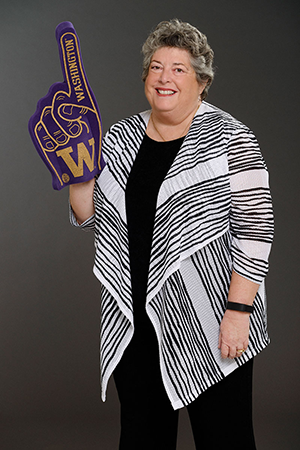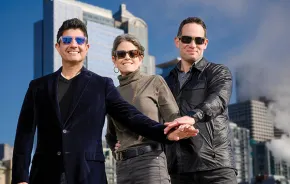
Inclusion isn’t about placement in a classroom. It’s about really belonging to a group, says Ilene Schwartz.
Schwartz would know. As the director of the Haring Center at the University of Washington (UW), she leads its Experimental Education Unit (EEU). This comprehensive early childhood school community provides inclusive education to all children.
Schwartz has also been a professor and researcher in the UW’s Special Education program since 1991. In that role, she’s mentored graduates who’ve offered special education instruction to generations of children. Her work on Project DATA (Developmentally Appropriate Treatment for Autism) led to the creation of a manual for teaching preschoolers with autism.
“Ilene has consistently espoused, fought for and demonstrated the value of inclusion, particularly for children with autism spectrum disorder, but really for all children with disabilities,” says Nancy Rosenberg, director of the UW’s Applied Behavior Analysis program. “She’s a great leader [at the Haring Center] because she excels at both the big-picture level — establishing the center’s vision — and at the fine-grained level of helping children and families. She’s always the first person in the room to help a struggling family, student, teacher or child.”
More than 30 years of working in special education has taught Schwartz that for inclusion to work, a teacher must be willing to change their behavior to accommodate a student’s needs. Schwartz also learned that to thrive, all children need to experience a daily moment of joy at school. There are so many pressures on children, she says, that making sure school is joyful is the least we can do.
“Their teachers need to experience joy, too,” she says. “I tell my students [at the UW that] we can’t lose sight of this idea.”
What’s the most misunderstood part of your job?
That people who work with people with disabilities are patient. It’s not patience; it’s stubbornness, steadfastness, compassion and passion. Patience means that you’re ready to make good with the status quo — special education educators are not fine with the status quo. We change the developmental trajectories of children.
What’s one small action our readers can take in their own lives to make positive change happen?
Be kind to people, especially people whom you perceive to be different than you. When I walk into a room and I don’t feel included, it’s always nice when someone reaches out and introduces themselves to me. How do we make sure everyone feels included and valued in the groups that we have? Primarily by being kind.
What’s one takeaway you’d like families to understand about your line of work or area of expertise?
That children with disabilities are children first. We need to recognize that any diagnosis a person may have, that’s one thing that describes the child, but it’s not everything. They have passions and interests. We need to develop their strengths as well as provide instruction in their area of need.
Best advice for kids with big ambition?
I think it’s great to have big dreams and accomplish those big dreams, but it’s also true that people should take care of themselves and others along the way. I did my graduate work at the University of Kansas and I had amazing mentors.
You can be an amazing scholar and still be a really nice person. That is a value I try to uphold. If you’re not kind to others and generous with your time, I’m not that interested in what you’ve accomplished.











